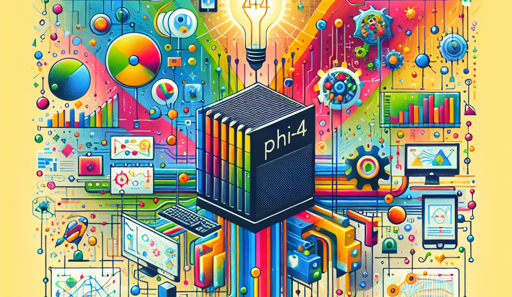TLDR: Microsoft’s Phi-4 is a small but powerful open-source AI model excelling in complex reasoning, math, and coding. It achieves top performance with only 14 billion parameters, outperforming larger models while being energy-efficient and cost-effective. Phi-4 is accessible on Azure AI Foundry and Hugging Face, promoting broader AI innovation across various industries.
The field of artificial intelligence is constantly growing, creating a huge need for AI models that are not only accurate but also efficient and easy to use. Microsoft has introduced Phi-4, a small language model (SLM) that goes against the common idea that bigger models are always better.
With just 14 billion parameters, Phi-4 is excellent at complex reasoning tasks, providing a cost-effective and energy-efficient option compared to larger models. Available on Microsoft’s Azure AI Foundry and Hugging Face, Phi-4 is open-source under the MIT license. This makes advanced AI technology more accessible to developers, researchers, and businesses around the world.
What is Microsoft Phi-4?
Microsoft Phi-4 is a state-of-the-art small language model designed for high performance in mathematics and programming.
- Size and Focus: It has 14 billion parameters and is designed for complex reasoning.
- Availability: Phi-4 can be found on Azure AI Foundry and Hugging Face.
- Open-Source: Released under the MIT license, it allows free use, customization, and deployment for academic and commercial purposes.
How It Works: Technical Innovations Phi-4 achieves its performance through several technical innovations:

- Training Methodologies: It uses high-quality synthetic data and curated organic data. The synthetic data is created using advanced techniques like multi-agent prompting and self-revision workflows.
- Key Token Search (PTS): This novel training technique identifies important tokens for the model’s output and optimizes their prediction, improving accuracy and efficiency.
- Direct Preference Optimization (DPO): This refines the output quality to align with human preferences.
- Transformer-Based Architecture: Phi-4 is built on a decoder-only transformer architecture and uses learning rate adjustments to balance convergence speed and model accuracy.
Competitive Advantages
Phi-4 has several advantages over other AI models:
- Superior Performance: It outperforms comparable and larger models in math and reasoning. For example, it scored 91.8 on the American Mathematics Competition (AMC 12), surpassing Gemini Pro 1.5 and GPT-4o.
- Compact Size and Energy Efficiency: Phi-4’s lightweight architecture allows it to run on consumer-grade hardware, reducing the need for expensive server infrastructure and aligning with sustainability goals.
- Specialization: Training on curated datasets provides superior domain-specific accuracy compared to generalist models.
Microsoft’s Phi-4 demonstrates strong performance across various benchmarks. On the MATH benchmark, it scored 80.4, outperforming many larger models. In the American Mathematics Competition (AMC 12), Phi-4 achieved a score of 91.8, surpassing Gemini Pro 1.5 and GPT-4o. For code generation, Phi-4 scored 82.6 on HumanEval. Additionally, it achieved a score of 84.8 on MMLU (Massive Multitask Language Understanding), showcasing its multitasking language understanding capabilities.

Benefits for Small and Medium-Sized Businesses (SMBs) Phi-4 offers several benefits for SMBs:
- Cost-Effectiveness: Its compact size and energy efficiency reduce computational and energy costs.
- Accessibility: Phi-4 makes advanced AI capabilities available to mid-sized organizations and researchers.
- Versatile Applications: It can be used in healthcare, finance, education, and customer service.
- Healthcare: Assisting with diagnostics and patient management.
- Finance: Enhancing predictive analytics for risk management.
- Education: Supporting personalized learning with tailored content generation.
- Customer Service: Automating interactions while ensuring compliance with customer data policies.
Ethical and Safety Measures Microsoft has integrated responsible AI principles into Phi-4:
- Content Filtering: Prevents the generation of harmful or biased content.
- Adversarial Testing: Identifies and mitigates potential risks.
- Safety Alignment: Aligns the model’s outputs with human values and preferences.
- Azure AI Content Safety Tools: Leverages prompt shields and protected material detection.
Microsoft’s Phi-4 is a testament to the power of innovation in AI. Its compact size, high performance, and open-source availability redefine what’s possible in AI.
By democratizing access to cutting-edge technology, Phi-4 paves the way for a more inclusive and sustainable AI ecosystem, empowering developers and businesses to innovate without traditional barriers. As the tech industry advances, Phi-4 stands as a symbol of sustainability, accessibility, and innovation, setting a new standard for the future of AI.
Sources: Microsoft Phi-4 Research Paper, Microsoft Blog Article.




















